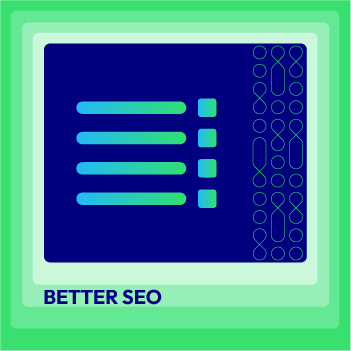Magento Conversion Rate Optimization Strategies Article

If you are an online merchant, or aspiring to be one, the obvious first step you need to take is to decide on what eCommerce platform you are going to us. If you are one of the many who have chosen to use Magento for that purpose, then it’s time to think about how to get the most out of your store.
While having a competitive, high-quality product is essential, making sure the product is well-marketed is perhaps even more important. Conversion Rate Optimization (CRO) is the process that helps you to convert site visitors into customers. Naturally, you want your conversion rates to be as high as possible, simply because you want to, well, sell more. Here are some foolproof ways to increase your conversion rates and improve the overall business performance of your (or your client’s) online store if you are using Magento for your online store.

What Is Magento Conversion Rate Optimization?
Magento conversion rate optimization (CRO) is a systematic process to enhance your Magento store’s performance. The main goal is to elevate the conversion rate, increasing the proportion of website visitors who transition into valued customers. This dynamic approach is a great way to not only optimize user experience but also boost sales in your online store.
For example, the company’s blog attracts 5,000 monthly visitors, resulting in 500 email sign-ups with a conversion rate of 10%. If the content team implements a content optimization strategy, the conversion rate will increase by 2%. The number of monthly email sign-ups could increase to 520. This Magento conversion rate optimization contributes to a stronger email subscriber base and business growth through targeted marketing efforts.

3 Steps to Enhance Magento Conversion Rate
Here is a 3-step process that you need to follow if you are in need of Magento conversion rate optimization
Identify your key conversions
The first step is to identify the specific goals you’re trying to achieve and align your strategy with specific requirements. This could be increasing checkout conversions, form submissions, newsletter sign-ups, average order value, or conversions of a specific product.
Understanding who your target audience is and where they are in their buying journey is crucial to identifying your key conversions.
Check your site

It is necessary to audit your Magento site. This step involves a rigorous analysis of various elements, encompassing user experience, content quality, and the efficiency of conversion funnels. It helps identify underperforming areas and crucial issues hindering your conversion rates.
Implement the proposed modifications and follow the results
Once you’ve identified your requirements and conducted a site audit, you can start making optimizations to your Magento site . Optimizing website elements such as design, content, call to action, and user flows is necessary. This not only directly influences user satisfaction but also significantly increases the probability of successful conversions into loyal customers.
Advanced Strategies for Magento Conversion Rate Optimization
Here are some Magento Conversion Rate Optimization (CRO) strategies that can help you boost your online sales and enhance user experience:
Personalize Customer Experience

Understanding consumer behavior and purchase history is vital for recommending relevant products and promotions, offering an enhanced shopping experience. Thorough audience research not only increases conversion rates but also ensures customer loyalty.
Moreover, by delving into individual preferences and tailoring offerings accordingly, businesses can witness tangible improvements in customer engagement and satisfaction.
For instance, implementing personalized strategies based on comprehensive data analysis has proven successful for many leading enterprises, resulting in not only increased sales but also a strengthened bond between the brand and its customers.
Use Site Heatmaps
Another effective way to optimize Magento conversion rates is to use Site Heatmaps.
A heat map visually represents how users on the web interact with your site. It will indicate areas where customers pay the most attention, how far they scroll down a page, or which elements attract the most attention when the user clicks and moves the mouse. For this reason, you can make appropriate design choices and adjust content to enhance user engagement.
Optimize Product and Category Pages
Well-organized product and category pages can help users navigate your website and find what they want. You can optimize these pages by adding high-quality images and customer reviews. With this method, you can help customers make informed purchasing decisions.
Besides, to optimize these pages effectively, it is necessary to limit the number of items per page. This will allow smooth site navigation and simplify the decision-making process for customers. Each product description needs to be short and highlight key features that make your product pages appealing to site visitors.
Optimizing page depth and creating a harmonious visual look on your website are pivotal elements for decreasing exit rates. It is essential to balance between attracting users and encouraging prolonged engagement.
Improve Search Functionality

Improving the effectiveness and relevance of on-site search engines is crucial for helping users find what they’re looking for quickly. Ensuring that your site’s search bar is easily visible and precise is essential, providing not just easy access but also accurate and speedy results.
Optimizing search functionality is a key aspect of Conversion Rate Optimization (CRO), providing users with a rich experience and minimizing bounce rates.
Here are some ways to optimize your Magento store’s search functionality:
-
Optimizing Search Results: Search results optimization can help users find what they’re looking for quickly and easily. You can upgrade your search results with product images, detailed descriptions, and reviews.
-
Making Use of Synonyms and Related Terms: Using synonyms and related terms can help users find what they’re looking for, even if they don’t use the exact search term. You can optimize your search functionality by adding synonyms and related terms to your search index.
-
Using Advanced Search: Employ advanced search can help users find what they’re looking for quickly and easily. You can optimize your search functionality by adding advanced search options such as filtering by price, color, or size.
-
Optimizing Search Speed: Optimizing search speed can significantly improve user experience and reduce bounce rates. You can optimize your search speed by compressing images, minimizing HTTP requests, and using a content delivery network (CDN).
-
Exploiting Search Analytics: Search analytics can help you comprehensively understand user interactions with your search functionality. You can optimize your search functionality by analyzing search queries, click-through rates, and conversion rates.
Implement a Mobile-First Approach
Because more users turn to their smartphones for online shopping, the strategic emphasis is ensuring mobile-friendliness and prioritizing the overall mobile experience.
A responsive design is at the core of this strategy, as it allows your website to adapt seamlessly to various screen sizes. This way provides a consistent and user-friendly experience for different devices.
Mobile-friendliness is not only important for user satisfaction but also plays a significant role in search engine optimization (SEO). Google, in particular, prioritizes mobile-friendly websites in its search rankings. Therefore, implementing a responsive design can positively impact your Magento store’s visibility on search engine results pages (SERPs), ultimately driving more organic traffic to your site.
Check SEO regularly
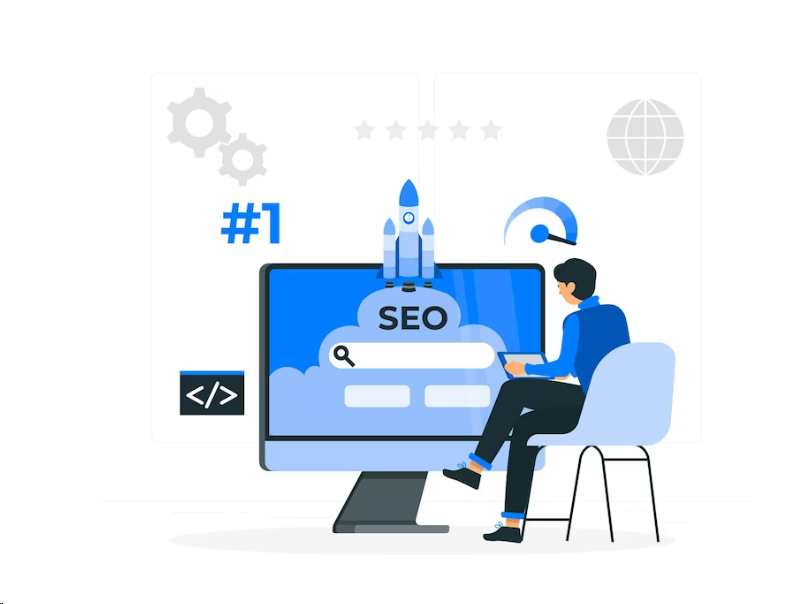
Regular SEO checks are essential to make sure that the SEO strategy is on track and the website is optimized for search engines. When broken links and code errors appear on your website, you need to identify any 404 response code errors and fix them.
Fixing these issues ensures satisfactory user experiences and helps maintain Magento SEO ranking. If you do this work well, you’re not missing out on any potential traffic.
Implement Email Marketing
Personalized emails are considered an effective strategy. They allow the delivery of tailor-made product or service recommendations based on analyzing customer preferences and behaviors.
By delving into your audience’s needs and preferences, you can create email marketing campaigns that resonate with distinct demographic clusters. This not only improves the level of interaction but also plays a significant role in increasing conversion rates.
According to a study by Campaign Monitor , personalized emails have 2.5 times higher click-through rates and are 6 times more likely to drive a conversion. Additionally, 73% of consumers report they want to collaborate with brands that use personal information to increase relevant experiences.
Optimize Checkout Process
According to Statista , the average online shopping cart abandonment rate was 69.82% in November 2021. The figure has been gradually increasing since 2014, indicating that online retailers face difficulty in converting website visitors into customers.
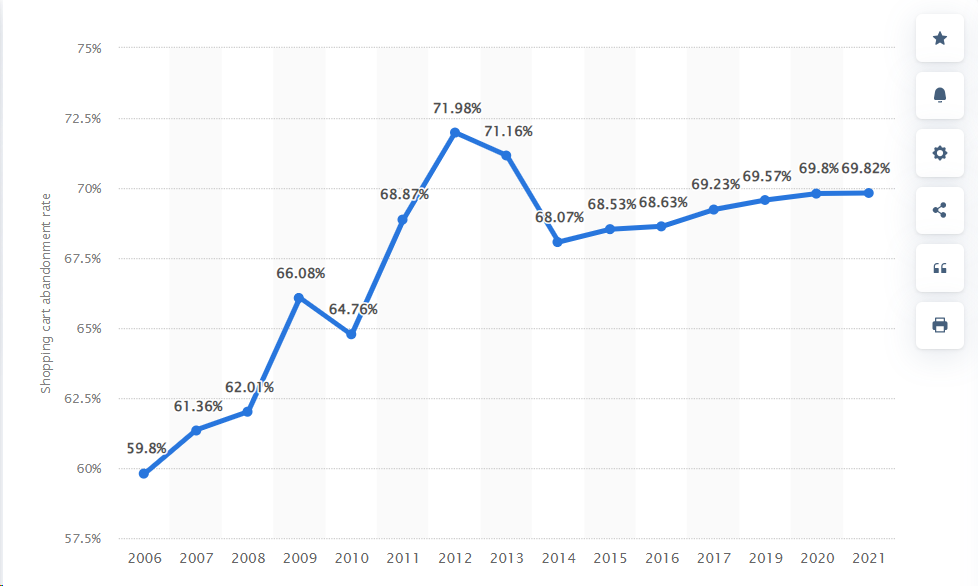 Customers can postpone, cancel, or exchange products in the blink of an eye. But there’s an escape for store owners. The best-optimized checkout process can reduce the cart abandonment rate effectively. Therefore, a seamless and smooth checkout process is crucial for reducing cart abandonment in e-commerce. Simplifying the steps, minimizing form fields, and ensuring a user-friendly experience can significantly increase conversion rates.
Customers can postpone, cancel, or exchange products in the blink of an eye. But there’s an escape for store owners. The best-optimized checkout process can reduce the cart abandonment rate effectively. Therefore, a seamless and smooth checkout process is crucial for reducing cart abandonment in e-commerce. Simplifying the steps, minimizing form fields, and ensuring a user-friendly experience can significantly increase conversion rates.
In addition to optimizing the checkout process, clear communication channels, transparent return policies, and accurate delivery timelines are essential components that can positively impact customer satisfaction.
Moreover, customers value precision and transparency in their transactions, and providing this information strengthens trust and confidence in your online store. Consequently, you can elevate conversion rates.
Ensure Secure Payment Methods
When customers shop online, you need to protect customers data and prevent fraudulent activities. Any doubts about the security of the online shopping experience can lead to abandoned carts and potential loss of sales. In consequence, ensuring secure payment methods is vital for conversion rate optimization.
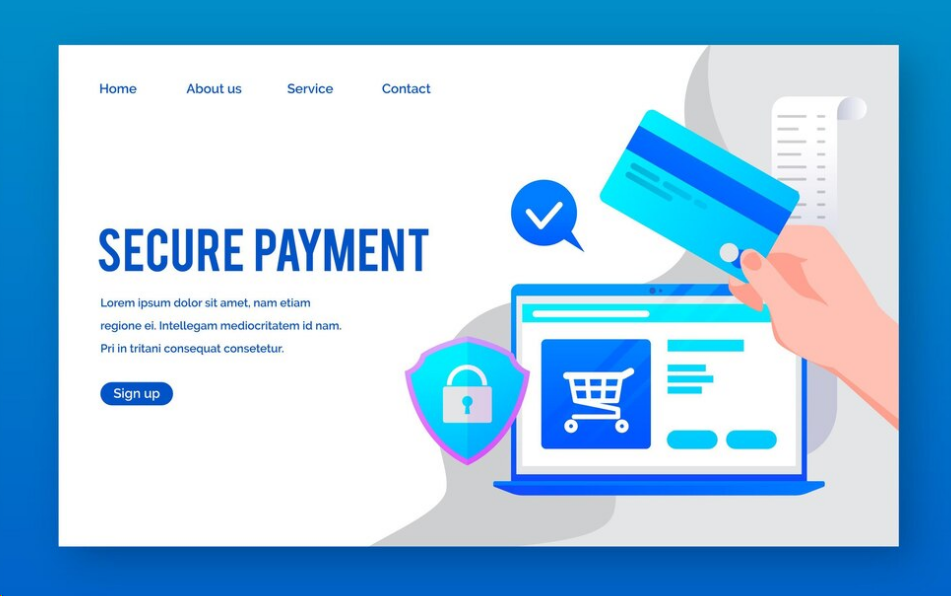
Provide a Smooth Return Policy
A seamless return policy functions as a veritable safety net for consumers, providing them with unequivocal assurance. Should a product fail to align with their expectations, a hassle-free return process is readily available. This absolute commitment can help reduce any hesitancy in the purchase decision-making process and substantially elevates the probability of successful conversion. Moreover, the implementation of a transparent and easily understandable return policy serves to augment not only immediate customer confidence but also cultivates a profound sense of loyalty.
Add Exit Intent Popups
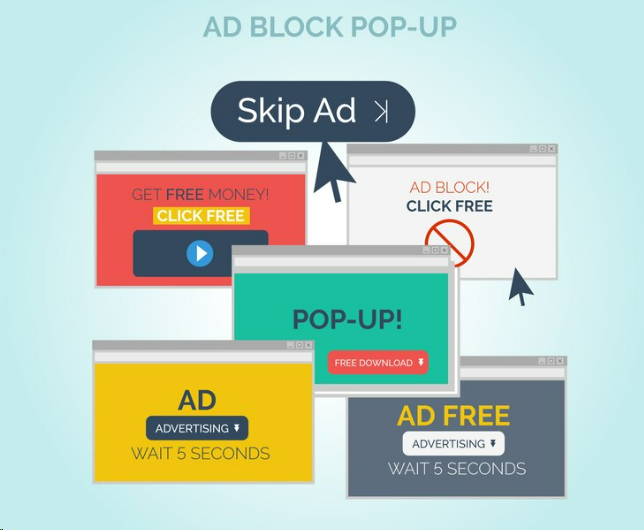
Exit intent popups are triggered when a user is on the verge of leaving your website. Their purpose is twofold: offering enticing incentives and capturing valuable contact information to encourage users to either stay or make a purchase.
These popups play a pivotal role in Conversion Rate Optimization (CRO) by strategically providing incentives or crucial information when a visitor considers leaving.
When you make use of exit intent popups’ power, you can attract users to stay. It creates a user-friendly experience to encourage interactions and boost your conversion rates.
Run A/B Testing for Continuous Improvement
A/B testing is considered a widely used method to optimize website performance. It involves comparing two versions of a website, advert, email, popup, or landing page against each other to determine the better-performing variation.
Therefore, this strategy helps businesses identify the factors contributing to better performance and allows them to make informed decisions about changes to optimize for improved results.
Elevate CRO with Magento extensions

Magento offers a wide range of extensions to enhance your store’s functionality and refine key elements of your conversion strategy. Whether you’re looking to speed up website loading times or simplify the checkout process, various plugins are available to meet your optimization needs.
Magento extensions play a crucial role in creating a seamless, personalized shopping journey, increasing the capability of successful conversions. By using Magento extensions, you’re not just improving your store but also creating a great customer experience.
Respect Customer Privacy
One thing to note is that when customers make a purchase, they do not want to share their personal information.
It is imperative to avoid sending spam emails that search for sensitive personal information, as it can impact how customers perceive your brand. Allow customers to decide what information they want to share on your website and adhere to privacy regulations such as GDPR.
Use High-Quality Images And Video

Having high-quality images and video is an important element in conversion rate optimization. They elevate the aesthetic appeal of your Magento store and provide customers with a more specific and detailed view of your products, leading to informed purchase decisions.
Transforming the User Experience (UX) on your Magento site goes beyond having product pages. It involves orchestrating a harmonious blend of captivating and optimized product images captured from multiple angles. These pictures attract customers to explore in-depth products.
Note:
Uploading heavy photos or clips might negatively impact your store speed. Try to lighten your page with image optimizer , converting PNG/ JPG images to WEBP which is lighter but can still keep the original quality. Implement Effective Call-to-Actions (CTAs) {#implement-effective-call-to-actions}
The efficacy of a Call to Action (CTA) crucially depends on its clarity and impression. Ambiguity tends to sow confusion and hesitation among users.
When creating CTAs, use language that is not only clear and concise but also devoid of any room for interpretation. You need to choose dynamic verbs that trigger an immediate response; examples include ‘Explore Now,’ ‘Subscription Today,’ or ‘Uncover More Opportunities.’ This strategic approach can help increase conversions and sales.
Effective Conversion Rate Optimization Tools
There are many eCommerce conversion optimization tools that can help you improve your online store’s performance. Here are some of the best tools you should consider:
Google Analytics

Magento is highly compatible with numerous essential Conversion Rate Optimization tools. For small to medium-large online stores, the Magento 2 ga4 stands out as an indispensable resource due to its ease of use and powerful features, such as:
-
Audience insights: Understand who your visitors are, their demographics, and behaviors.
-
Acquisition data: Learn how users find your website and which channels are most effective.
-
Behavior analysis: Discover how users interact with your site and what content keeps them engaged.
-
Conversion tracking: Set up goals to measure how well your site meets your target objectives.
If you have never used this tool before, don’t panic.
It may seem complicated and overwhelming, but it’s really rather easy and intuitive. You don’t even have to use all the metrics offered in Google Analytics. For CRO, the most important thing to review periodically is the Conversion Rate, which gives you an insight at how your conversions are going and how much you need to improve.
Also, check your Exit Rate, but bear in mind - it’s not the same thing as the Bounce Rate. Exit Rate usually points to poor content, low speed and technical issues, while Bounce Rate means that you’re getting a lot of low quality traffic.
Average Session Duration, along with Average Page Depth, are both valuable indicators of how your visitors behave on your page. These are pretty self-explanatory - in order to get better conversion rates, you obviously need to improve both of them.
Finally, keep an eye on traffic sources, since changing them in some way usually leads to a change in the conversion rate, either positive or negative. Google Analytics Enhanced Ecommerce is a very useful tool, giving you important insights into what’s going on at your site on the visitors’ end, but keep in mind that these are just insights pointing at where the change should be directed. The nature of the change (the actual things you will have to improve) will depend on a lot of factors that you will still have to figure out.
Moving on from Google Analytics, Magento supports a number of useful CRO tools which are very inexpensive, and are therefore ideal for ecommerce owners on a budget. For example, MageMail is an excellent abandoned cart recovery tool, slightly better than similar tools that come with Magento.
It is not free, but you pay for resulting conversions only. Inspectlet is free if you opt for the basic plan, and it is a tool that allows you to see exactly where your shoppers are experiencing problems thanks to website heat maps that show you how visitors are interacting with your site.
For social analytics (showing which social media platforms are bringing the best conversions), we might recommend a great platform called AddShoppers, which can easily be integrated with Magento. Finally, for A/B split testing, you can either go with Google Content Experiments for free or try some easier and speedier solutions, like Optimizely and VWO.

Google PageSpeed and Google Lighthouse
These platforms audit your site’s speed and analyze your site based on performance, SEO, best practices, and accessibility. Improving your site speed is an important conversion rate optimization strategy.
Key features include:
-
PageSpeed insights: Combine lab data with real-world data from the Chrome User Experience Report to give a comprehensive view of a page’s performance.
-
Lighthouse: Focus on lab data only, providing an analysis of performance, accessibility, best practices, and SEO in a controlled environment.
Hotjar
Hotjar is heat mapping software that provides a deeper understanding of user behavior through its analytics and feedback suite. The information aids in calibrating websites to maximize user interaction and conversion rates. Key features include:
-
Heatmaps: Visually represent where users click, move, and scroll on your site, giving insights into user engagement and areas for improvement.
-
Visual representation: Map user interactions using a color-coded system, highlighting areas of intense activity with vivid colors for quick identification.
-
Session recordings: Record user sessions to observe how visitors interact with your site, identifying usability issues and opportunities for optimization.
-
Surveys and feedback: Collect direct user feedback, allowing you to understand the ‘why’ behind user actions and make data-driven decisions.
InstaPage
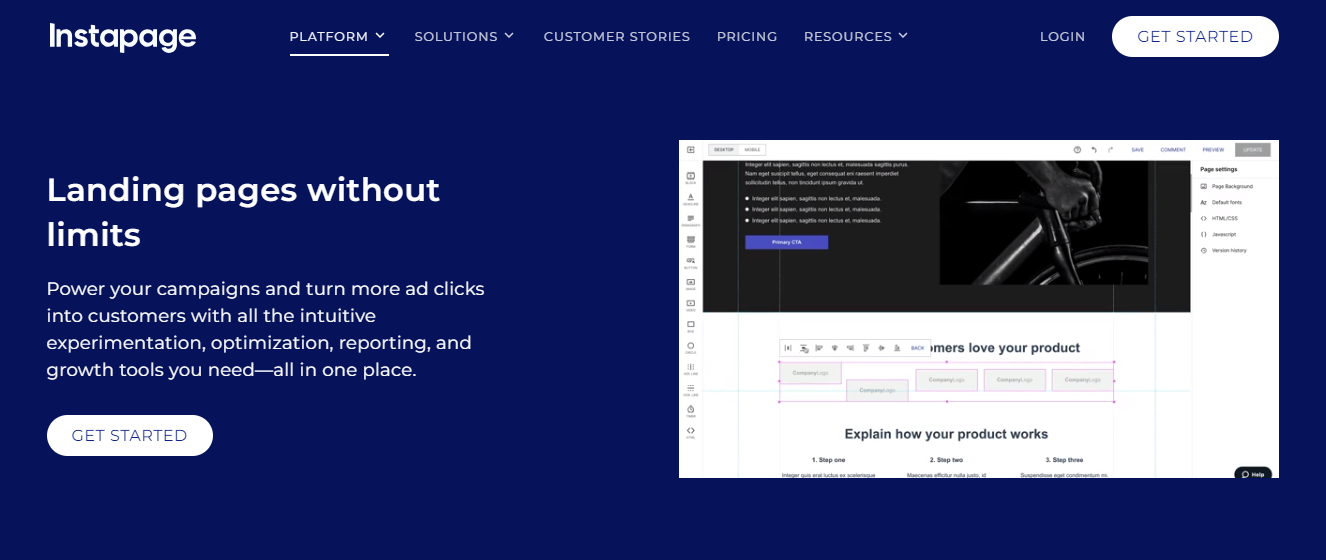
InstaPage is a powerful solution for post-click optimization, focusing on maximizing conversions from ad clicks.
Key features include:
-
Personalized landing pages: Create landing pages adjusted to individual audience segments through customizable templates.
-
Experimentation: Optimize landing pages and improve conversion rates through A/B testing and other experimentation tools
-
Scalable creation: Create multiple landing pages quickly and efficiently, serving various campaigns and audience segments.
Mailchimp
Mailchimp helps to boost conversion rates through targeted email marketing strategies. It engages and re-engages site visitors effectively. This service aims to distribute personalized content, increasing the chance of converting subscribers into loyal customers.
Key features include:
-
Automated workflows: Set up email sequences triggered by specific customer behaviors or milestones.
-
Transactional emails: Send updates about purchases or account activity with personalized emails.
-
Retargeting ads: Bring back visitors who left your site without converting through targeted ads.
-
Predictive segmentation: Use AI to predict which users are most likely to engage or purchase, allowing for more targeted campaigns.
Hubspot
Hubspot is a cloud-based CRM that offers scalable CRO tools for inbound marketing and sales. It assists in the design of landing pages, personalized email templates, various layouts, and forms and also manages the scheduling of extensive social media content.
Key features include:
-
Lead capture: Attract and convert leads through forms, pop-ups, and live chat.
-
Analytics: Track and measure marketing efforts and conversion rates through in-depth analytics
-
CRM integration: Manage all customer interactions and data, ensuring a cohesive customer experience.
OptinMonster
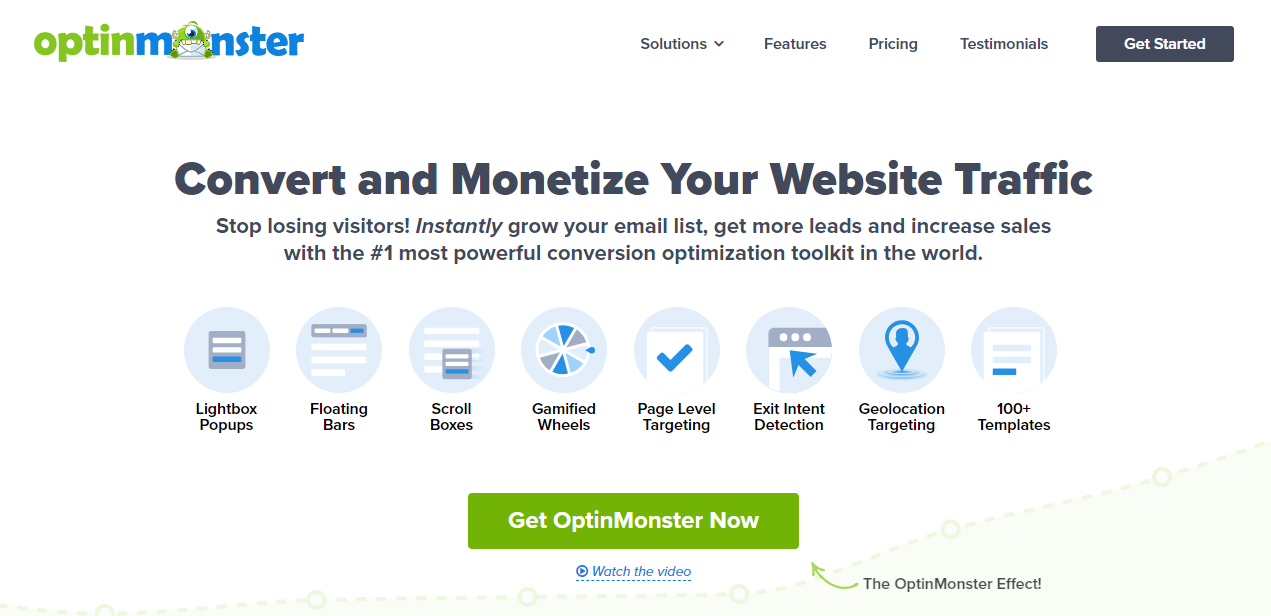
OptinMonster is a powerful tool that helps you create high-converting opt-in forms and popups. It provides useful features such as exit-intent technology A/B testing.
-
Multiple form types: Include pop-ups, floating bars, fullscreen overlays, and slide-ins.
-
Exit intent® technology:** Detect when a user is about to leave your site and prompt them with a targeted message.
-
Page level targeting: Allow hyper-segmentation of leads with enterprise-grade targeting rules.
-
OnSite retargeting® and personalization: Display customized offers based on visitor behavior.
-
A/B testing: Test different headlines, content, and layouts to optimize conversions.
-
Analytics and insights: Provide statistics to improve lead generation strategies and split test ideas for increased conversions.
The Complete Checklist for Optimizing Conversion Rates
-
Mobile optimization: Make sure your online site is mobile-friendly for smartphone users because most clients use smartphones for shopping.
-
Site performance: Optimize your website’s load time and use high-quality product images, which help to ensure a smooth user experience.
-
Content quality: Create detailed and thoughtful product descriptions.
-
SEO and structure: Optimize your site’s structure and on-page SEO techniques to enhance the store’s visibility and attract more targeted visitors.
-
Visual design: Focus on your website’s color palette, as different colorings can trigger a range of emotions in visitors.
-
Industry trends: Stay updated with the latest e-commerce trends to enhance CRO efforts continuously.
-
Technical implementation: Optimize your Magento store with industry-best plugins for a solid CRO strategy.
-
Performance tracking: Monitor your website’s metrics and conduct A/B testing to evaluate the effectiveness of your CRO strategies, which is crucial for successful conversion rate optimization.
Bonus Tip: Things to Avoid
Of course, there are practices that are absolute conversion-killers and should be avoided at all costs.
One is hidden costs – if you don’t offer free shipping, make it clear from the get-go. Unforeseen costs are a big turn-off for any customer and always come with a risk of cart abandonment, which is detrimental for your “cart to sale” conversion rates.
Next, make sure your customers can reach you quickly and easily via live chat, phone or email. Also, make your return policies and delivery timelines very clear. Here’s a little trick – don’t state your estimated delivery time as an approximate time-frame (“in 2-4 days”), rather, try to use an estimated date (“Nov. 18th). It’s been proven to have a positive effect on customers, just like express checkout and “wallet” payment options.



